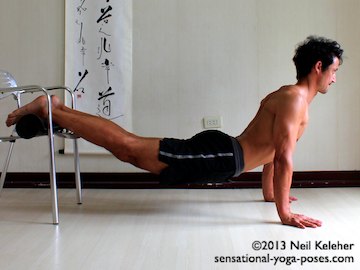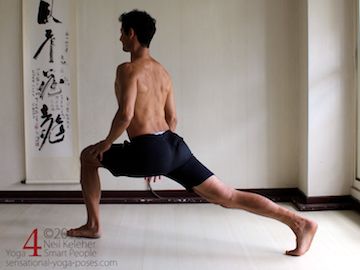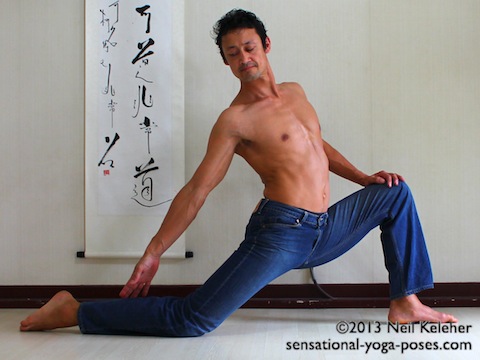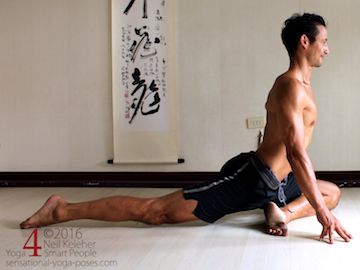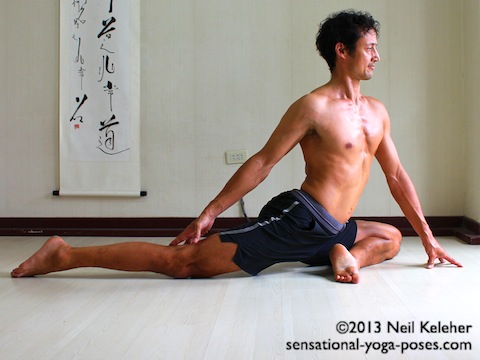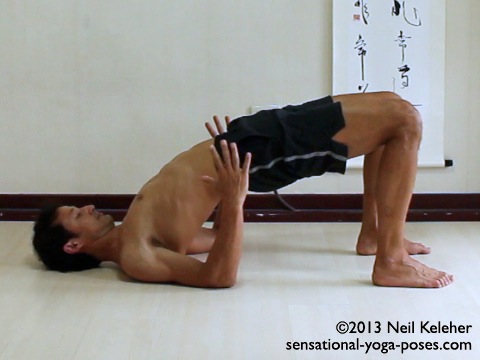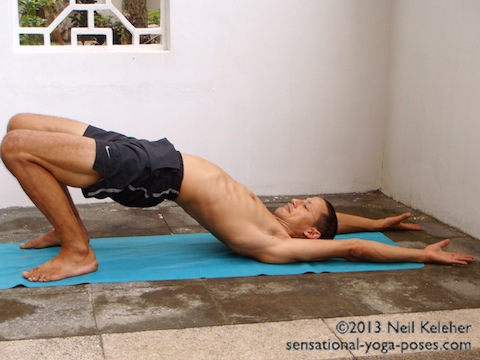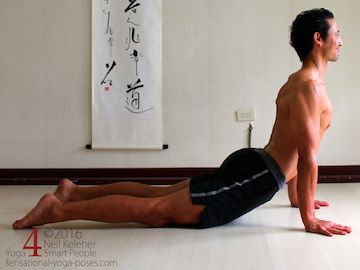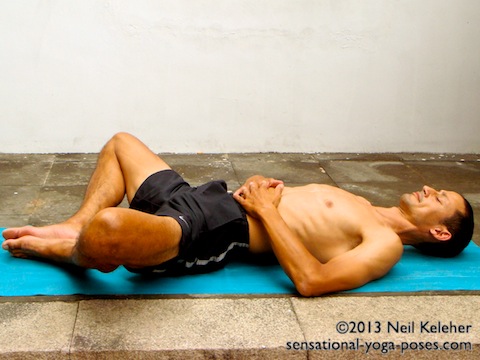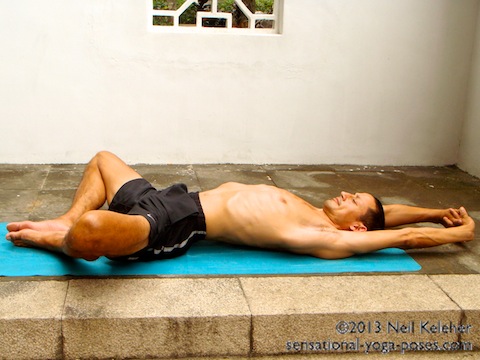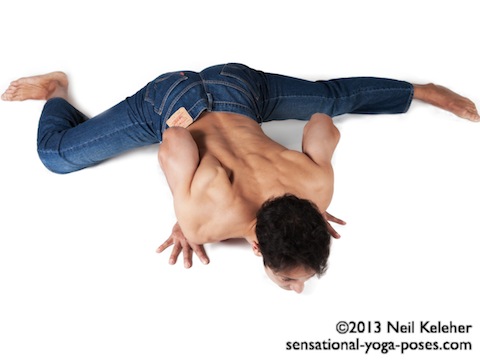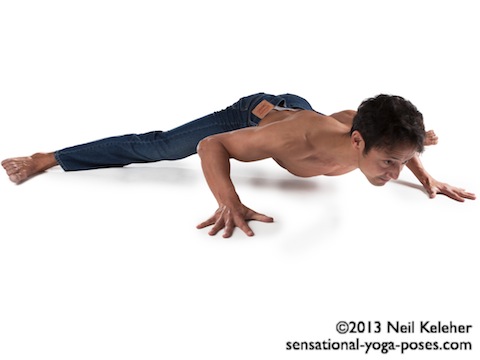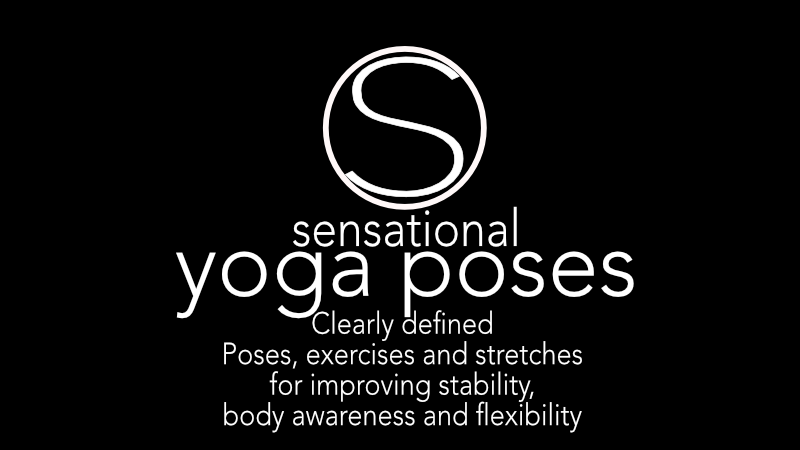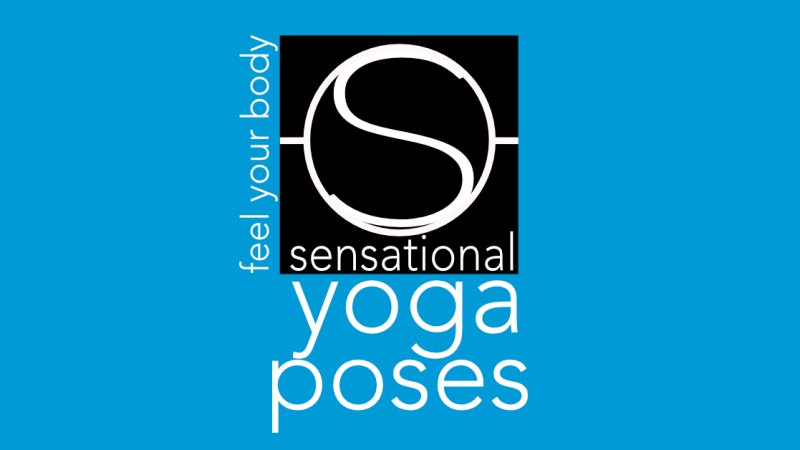Psoas Stretches | Psoas Stretches 1
Psoas stretches index
Related
-->
For the high lunge psoas stretch start with one leg forward and the other back. Have your front foot and back knee about hip width apart to make balancing easier.
Bend your front knee and position your front foot so that when viewed from the side your knee is over a point just in front of the heel.
Press your back foot into the floor and for a slightly different feel, press your toes down also.
Working from the bottom up, focus on feeling your individual lumbar vertebrae (there are 5). Work at pulling each one backwards away from the front of your pelvis. When you get to the top of your lumbar spine, draw the back of your ribs upwards and from there lengthen the back of your neck also. (In the picture below my head is forwards.)
For an increased psoas stretch add a twist to your high lunge, twisting towards the back leg side.
Assuming your right leg is to the rear, focus on feeling the right side of your lumbar spine. Draw the right side of your lumbars backwards. You can also focus on pulling the left side of your lumbars forwards. Focus on your cervical vertebrae (your neck vertebrae or the part of the spine that makes up the neck) and do the same thing. Draw the right sides of your cervical vertebrae backwards and the left side forwards. Then do the same with your thoracic vertebrae.
You can also reach your right arm back and down, reaching gradually towards your right heel. Externally rotate the arm and open the front of the right shoulder and right chest.
(Also experiment with twisting towards the same side as the front leg.)
Upright pigeon can be done with the same technique to stretch the psoas. (Here's a general review of pigeon yoga pose.
With your right shin forwards and left leg back, position your front knee slightly outside of the hip when viewed from the front. Reach your back leg straight back.
Have your hands on the floor in front of you to support your upper body.
Press down with the right knee to lift the right hip and then vary the pressure so that your pelvis is level from left to right. As for the high lunge psoas stretch, focus on drawing your lumbar vertebrae backwards, away from the inguinal creases. (These are the lines that separates your belly from your inner thighs.)
Draw your back ribs up and lengthen the back of your neck or as with the lumbar vertebrae, work from the bottom upwards and draw each of your cervical vertebrae backwards (There are seven cervical vertebrae).
Move your hands back further to lift your ribcage higher. Push your pelvis down and back, as if reaching away from the front knee. Reach your back leg rearwards at the same time.
Note that back foot can be flat on the floor (top of the foot on the floor) or toes can be tucked forwards.
Upright Pigeon Psoas Stretch with a Twist
As with high lunge you can also add a twist that starts at the lumbar spine. Turn towards your back leg side. With right leg back, reach the right side of your lumbars and cervical vertebrae backwards. Reach the left side of these vertebrae forwards. Do the same with your thoracic vertebrae.
Optionally reach the right arm back and down.
(Also try twisting to the same side as the front leg.)
To intensity the psoas stretch in both high lunge and upright pigeon you can press the back foot down and lift your back knee.
To develop awareness, focus on pressing your back foot into the floor. See if you can press it down with enough pressure to the point that the knee is just about to lift. Then relax.
An option is to pull upwards on the rear most thigh. In either case, work at gradually adding tension and gradually release it.
Lying on your back with knees bent and then lifting the pelvis into bridge pose, the action of pressing the pelvis upwards opens the front of the hip joint and creates a psoas stretch. The closer the thighs are together the more the psoas is lengthened.
If you had the feet wider than the knees so that the thighs where internally rotated this could presumably lengthen the psoas even further (assuming that the pelvis is still at the same height.)
If your psoas is a little tight and you wanted to get more height in bridge pose, then you may find it helps to widen your legs and externally rotate them.
To focus on stretching the psoas use your legs to press your pelvis higher. Then draw your lumbar vertebrae downwards, away from the front lip of your pelvis. (It's the same action as in high lunge and upright pigeon, the main difference is that in this pose your belly faces upwards as opposed to forwards. Plus your knees are both lifted.
You can have arms forwards or back in bridge yoga pose.
Upward dog can also be used to stretch the psoas if you focus on opening the front of your hips.
With knees straight push your feet down and pull up on the thighs. Use your spinal erectors to curve the lumbar spine and thoracic spine backwards. (Start from the bottom and work your way upwards towards the head so that you gradually curve these parts of the spine rearwards.)
Experiment with drawing your lumbar vertebrae backwards, away from the inguinal ligaments. Then experiment with creating a forward pull on the lumbars.
Another psoas stretch is upward dog with the feet elevated.
In this position you can use body weight to assist in the psoas stretch.
With feet elevated, the hips are further away from the hands meaning that the bodies center of gravity is also further away from the hands and closer to the feet. This means there is more weight on the feet in this position that in regular upward facing dog.
To get into this stretch comfortably, start with your hips lifted high. Slowly sink them down. Actively press your feet into the chair. Vary the amount of pressure you use to press your feet down with.
Notice the effects of changes in foot pressure. Find the amount of pressure that makes the pose feel good.
Sitting upright with legs straight ahead, internally rotating the thighs (so that the inner thighs move down) lengthens the distance the psoas crosses while externally rotating them shortens it.
In bound angle pose the thighs are externally rotated which shortens the distance the psoas crosses. However the legs are wide which lengthens it.
If you lie back in bound angle, that lengthens the psoas even further.
While lying back in bound angle, experiment with slowly drawing the lumbar vertebrae down, towards the floor, then slowly release. Then repeat.
Using side splits to stretch the psoas
Sitting upright in an L-shape, the wider you make your legs (with knees pointing upwards) the greater the distance the psoas crosses. You may find that if you widen your legs wide enough, such as when doing side to side splits, that your lower back pulls forwards, or in the case of splits, downwards, towards the floor.
You can try half split first, and then work towards side splits with both legs straight. And to make both of these poses easier on the arms you can rest on your elbows.
With your pelvis sinking down, you can experiment with drawing the lumbars upwards, away from the floor for an even deeper psoas stretch.
(Above photos by Johan Vosloo. Thanks Johan)
For more read psoas stretches 1. It includes a slightly different approach to stretching the psoas.
Published: 2020 08 03
Updated: 2021 01 29
